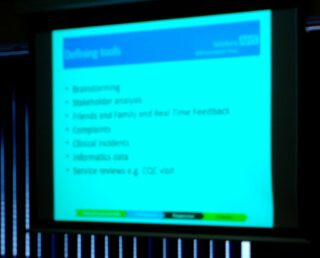Q Exchange
Peer support scheme for Junior doctors tailored around training rotations.
- Idea
- 2018

Meet the team: #peer2peer4docs
Junior doctors move wards and hospitals regularly without tailoring to their needs the transient nature of their training often leaves them neglected by the system, lack of coordination leads misses a wealth of innovation and ideas and means the projects they undertake often go unrecognised and not sustained. Morale in this group is low and engagement between them, clinical staff and management would be improved by a structured approach to support and adapting to their training system to maximise the benefits they can offer and provide information to them in a timely way. As Chief Registrar, I have spent the year discussing with stakeholders and designing up a system to facilitate peer support, innovation and improvement support to Junior doctors.
Doctors have staggered starts throughout the year and stay in each hospital for as little as 6 months sometime moving team each 4 months.
Coordination of information about non clinical opportunities provided to them on or before arriving in the trust would allow planning into their time with clinical commitments. Rolling peer support sessions starting within 6 weeks of starting work over a 6 week cycle allows them to meet each other and discuss ideas, challenges and need.
Improving morale improves patient care indirectly. The innovation and quality improvement would give direct patient care with trust buy in increasing sustainability.
Pilot booked for August/September.
How you can contribute
- Well supported idea by hospital. Advise of models to use and financial support. Methods for measurement of benefit
Comments
Susan Hayward 14 Jun 2018
I have discussed this with colleagues and aware of other rotational staff that may benefit.
Hawys Tomos 31 May 2018
Hello :) You might find the second Q Lab essay useful – ‘learning and insights on peer support’ – there’s a section about ‘evidence and measurement of peer support’: https://qlabessays.health.org.uk
Susan Hayward 5 Jun 2018
Thanks.
Simon Knowles 22 May 2018
Great project and a very battered population to support. One measure of success will be in your subsequent recruitment/retention record - the word gets round pretty quickly. You will already have seen that as a result of the QI coaching programme I suspect.
Entry and exit surveys; sickness rate; GMC survey; focus groups (esp if you can persuade the CQC to do a focus group when next they visit!) etc
Susan Hayward 5 Jun 2018
Thanks for your support this bid. I found your blog an interesting read helpful with the idea of supporting and encouraging people and using varied methods.
https://q.health.org.uk/news-story/workshop-fun-and-games-whats-not-to-like/
Susan Hayward 5 Jun 2018
REally helpful. Thanks
Comments are now closed for this post.